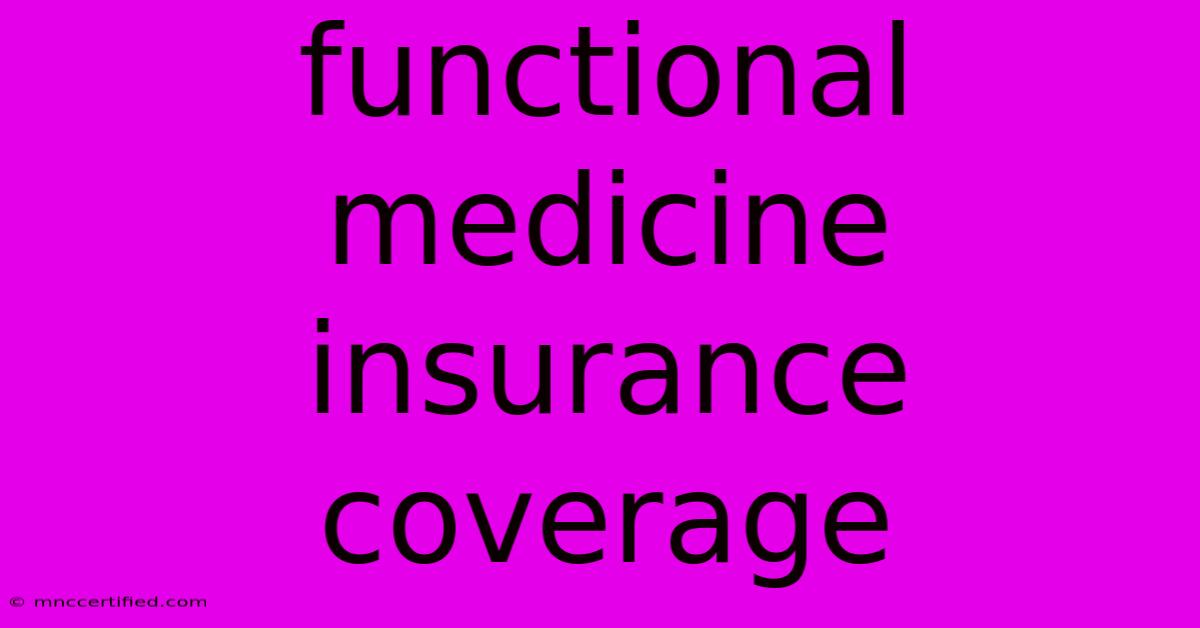Functional Medicine Insurance Coverage

Table of Contents
Navigating the World of Functional Medicine Insurance Coverage: A Comprehensive Guide
Functional medicine is gaining increasing popularity, offering a holistic approach to health that focuses on identifying the root causes of illness rather than just treating symptoms. But as more people explore this approach, a crucial question arises: does insurance cover functional medicine?
The answer, unfortunately, is not straightforward. While some insurance plans may offer partial coverage for certain functional medicine services, many do not. Understanding the complexities of insurance coverage for functional medicine is crucial for both patients and practitioners. This guide will delve into the current landscape, explore the challenges, and offer tips for navigating the system effectively.
Understanding Functional Medicine Coverage: The Challenges
The primary reason for the limited coverage of functional medicine lies in the traditional healthcare system's focus on acute care and symptom management. Functional medicine, however, often involves:
- Longer consultation times: Functional medicine practitioners spend more time with patients, conducting in-depth assessments, reviewing medical history, and crafting personalized treatment plans.
- Extensive lab testing: Functional medicine frequently utilizes lab tests to uncover hidden imbalances and underlying root causes, which can be considered "non-standard" by traditional insurance companies.
- Holistic approaches: Treatments may include nutritional interventions, lifestyle modifications, and supplements, which are not always covered under standard insurance plans.
Navigating the Insurance Maze: Tips for Patients and Practitioners
While navigating the complexities of insurance coverage can be frustrating, there are strategies for both patients and practitioners to maximize their chances of coverage.
For Patients:
- Check your policy: Thoroughly review your insurance plan's coverage details, specifically looking for terms like "alternative medicine," "integrative medicine," or "holistic medicine."
- Seek pre-authorization: For specific services or tests, inquire about pre-authorization procedures to confirm coverage and avoid unexpected out-of-pocket expenses.
- Consider an HSA or FSA: Explore utilizing Health Savings Accounts (HSAs) or Flexible Spending Accounts (FSAs) to cover eligible functional medicine services.
- Communicate with your doctor: Clearly explain your desire for functional medicine treatment and inquire about the specific services covered by your plan.
- Advocacy is key: If you encounter difficulties, don't hesitate to contact your insurance company and advocate for coverage based on the scientific evidence supporting functional medicine.
For Practitioners:
- Stay informed about coverage: Develop a strong understanding of your state's insurance laws and regulations regarding functional medicine.
- Offer transparency: Be upfront with patients about their out-of-pocket costs and potential coverage limitations.
- Educate patients on coverage options: Provide patients with clear information on how to access their benefits and explore alternative payment models.
- Collaborate with insurance companies: Engage with insurance companies to advocate for the inclusion of functional medicine services in their plans.
The Future of Functional Medicine Coverage: A Glimpse of Hope
Despite the current challenges, there are reasons for optimism regarding functional medicine coverage. The growing body of scientific evidence supporting functional medicine's efficacy, coupled with the rising demand for personalized and preventative healthcare, is gradually changing the landscape.
- Increased awareness: Greater public awareness of functional medicine's benefits is prompting more people to seek these services, potentially leading to increased demand and pressure on insurance companies to adapt.
- Emerging policies: Some insurance companies are beginning to recognize the value of functional medicine and are exploring ways to incorporate it into their coverage plans.
- Shifting healthcare paradigms: The focus on preventative care and personalized medicine aligns with functional medicine's core principles, potentially paving the way for greater insurance acceptance.
Conclusion: A Promising Path Forward
While functional medicine insurance coverage still presents challenges, it's essential to approach it with informed strategies and a proactive mindset. By understanding the system's complexities, patients and practitioners can advocate for better access and coverage for these valuable services. As the healthcare landscape evolves, the future of functional medicine coverage appears promising, suggesting greater integration and acceptance of this holistic approach to well-being.

Thank you for visiting our website wich cover about Functional Medicine Insurance Coverage. We hope the information provided has been useful to you. Feel free to contact us if you have any questions or need further assistance. See you next time and dont miss to bookmark.
Featured Posts
-
Iowa Vs Ucla Leistikows Time Factor Analysis
Nov 09, 2024
-
Rashida Jones Quincy Jones Was A
Nov 09, 2024
-
Bhad Bhabie Opens Up About Cancer Weight Concerns
Nov 09, 2024
-
Sell Final Expense Insurance From Home
Nov 09, 2024
-
Twin City Fire Insurance Company Claims
Nov 09, 2024